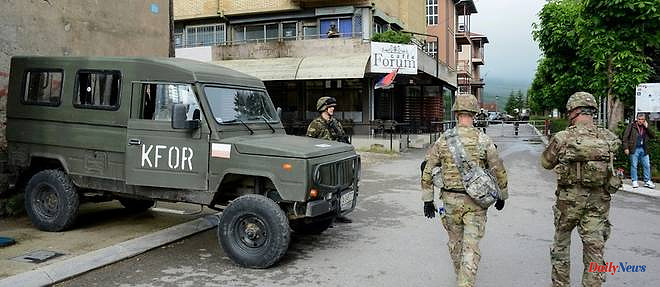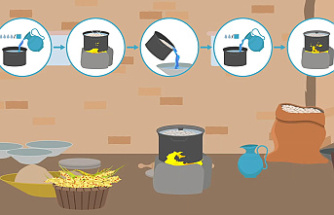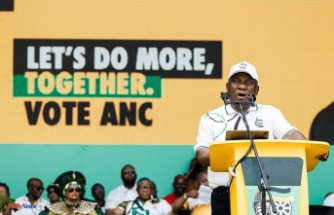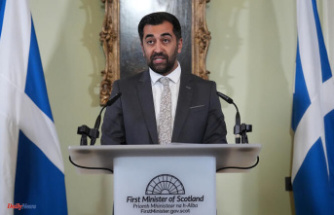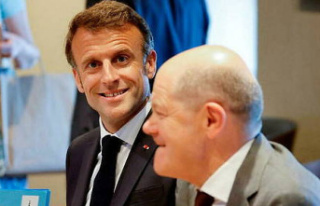Serb demonstrators remained mobilized on Thursday against the enthronement of Albanian mayors in northern Kosovo, the scene of recent clashes with NATO forces, at a time when international pressure is increasing on Pristina and Belgrade for a de-escalation of tensions.
While major international powers, notably Paris and Washington, initially attributed responsibility for the latest incidents to the Kosovar government, US Secretary of State Antony Blinken called on the two parties on Thursday to reduce tensions.
"We call on the governments of Kosovo and Serbia to take immediate steps to de-escalate tensions," Blinken said after a NATO ministerial meeting in Oslo. According to him, "the current escalation" jeopardizes their aspirations for European integration.
French President Emmanuel Macron adopted a similar attitude after a quadripartite meeting with the Serbian and Kosovar presidents in Chisinau, and after a meeting with German Chancellor Olaf Scholz.
“We have asked both parties to organize new elections in these four municipalities as soon as possible,” Macron said, insisting on “clear decisions” requested from the two leaders “for next week”.
According to the French president, this request implies a "commitment on the part of Kosovo" and the "participation in these elections in a clear way on the part of the Serbian side".
Questioned shortly after on this point, the President of Kosovo Vjosa Osmani assured that she was "ready to consider" this possibility.
On the ground, in Zvecan, in the north of Kosovo, the town of clashes at the start of the week between Serb demonstrators and soldiers from the NATO force (Kfor), a few dozen Serbs gathered again on Thursday in near the town hall, fewer than the previous days, reported an AFP journalist.
At this place, thirty international soldiers and fifty Serb demonstrators were injured in the clashes on Monday.
The municipal building has been protected since Tuesday by a large Kfor device, which further reinforced its defense on Wednesday with barbed wire and metal barriers.
KFOR soldiers also took up position Thursday on several axes leading to the city center, responding to the call of the main local Serbian party after incidents in which two Kosovar police cars were stoned on Wednesday by groups of people. "hidden".
A policeman was injured and car windows were smashed, according to the Kosovo Interior Ministry.
Serbia, supported by its Russian and Chinese allies, has never recognized the independence proclaimed in 2008 by its former province, and encourages the some 120,000 Serbs who live there (between 6% and 7% of the population), to challenge the authorities in Pristina.
The old foes are negotiating a deal to normalize relations under the auspices of the European Union, but the region has been going from crisis to crisis for years. The latter motivated NATO to decide to quickly deploy 700 additional soldiers there.
Serbs boycotted the April municipal elections in four localities in northern Kosovo where they are in the majority, resulting in the election of Albanian mayors with less than 3.5% turnout.
Their enthronement last week by the Kosovar government of Albin Kurti set fire to the powder.
The Serb demonstrators are opposed to the fact that these city councilors, whom they consider "illegitimate", occupy their functions and demand the withdrawal from the north of Kosovo of the Kosovar special forces.
In a new incident, which occurred during the day in the Serbian part of the divided city of Mitrovica (north), two Albanians were attacked and injured by a "group of masked criminals organized for this attack", indicated the Kosovo police in a statement.
In this city, several hundred Albanian Kosovars, mainly young people, briefly demonstrated in the middle of the day near a bridge which connects the two parts of the city, Albanian and Serbian, noted an AFP journalist.
Responding to calls to demonstrate launched on social networks, they waved Albanian flags and chanted "Mitrovica cannot be divided".
The Kosovar police had called on people not to go to this demonstration in order to avoid throwing oil on the fire.
The demonstrators had planned to go to the northern part of the city, but a large police cordon blocked their way to the bridge.
01/06/2023 20:10:19 - Zvecan (Kosovo) (AFP) - © 2023 AFP

